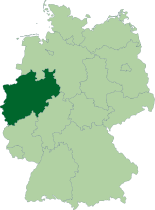Northrhine-Westfalia
|
North Rhine-Westphalia Nordrhein-Westfalen |
|||
|---|---|---|---|
| State of Germany | |||
|
|||
 |
|||
| Coordinates: 51°28′N 7°33′E / 51.467°N 7.550°E | |||
| Country | Germany | ||
| Capital | Düsseldorf | ||
| Government | |||
| • Body | Landtag of North Rhine-Westphalia | ||
| • Minister-President | Armin Laschet (CDU) | ||
| • Governing parties | CDU / FDP | ||
| Area | |||
| • Total | 34,084.13 km2 (13,159.96 sq mi) | ||
| Population (2015-12-31) | |||
| • Total | 17,865,516 | ||
| • Density | 520/km2 (1,400/sq mi) | ||
| Time zone | CET (UTC+1) | ||
| • Summer (DST) | CEST (UTC+2) | ||
| ISO 3166 code | DE-NW | ||
| GDP/ Nominal | €670/ $787 billion (2016) | ||
| GDP per capita | €36,500/ $42,900 (2015) | ||
| NUTS Region | DEA | ||
| Website | land |
||
| Significant minority populations | |
| Nationality | Population (2017) |
|---|---|
|
|
814,989 |
|
|
800,226 |
|
|
289,317 |
|
|
213,654 |
|
|
152,238 |
|
|
97,760 |
|
|
93,414 |
|
|
89,615 |
|
|
72,011 |
|
|
65,920 |
|
|
58,349 |
|
|
51,120 |
|
|
50,496 |
|
|
46,513 |
|
|
40,222 |
North Rhine-Westphalia (German: Nordrhein-Westfalen, pronounced [ˈnɔʁtʁaɪ̯n vɛstˈfaːlən], commonly shortened to NRW) is the most populous state of Germany, with a population of approximately 18 million, and the fourth largest by area. Its capital is Düsseldorf; the largest city is Cologne. Four of Germany's ten largest cities—Cologne, Düsseldorf, Dortmund, and Essen—are located within the state, as well as the second largest metropolitan area on the European continent, Rhine-Ruhr.
North Rhine-Westphalia was formed in 1946 as a merger of the provinces of North Rhine and Westphalia, both formerly parts of Prussia, and the Free State of Lippe. It makes up almost a quarter of the population and a quarter of the economy of Germany.
The first written account of the area was by its conqueror, Julius Caesar, the territories west of the Rhine were occupied by the Eburones and east of the Rhine he reported the Ubii (across from Cologne) and the Sugambri to their north. The Ubii and some other Germanic tribes such as the Cugerni were later settled on the west side of the Rhine in the Roman province of Germania Inferior. Julius Caesar conquered the tribes on the left bank, and Augustus established numerous fortified posts on the Rhine, but the Romans never succeeded in gaining a firm footing on the right bank, where the Sugambri neighboured several other tribes including the Tencteri and Usipetes. North of the Sigambri and the Rhine region were the Bructeri.
...
Wikipedia


